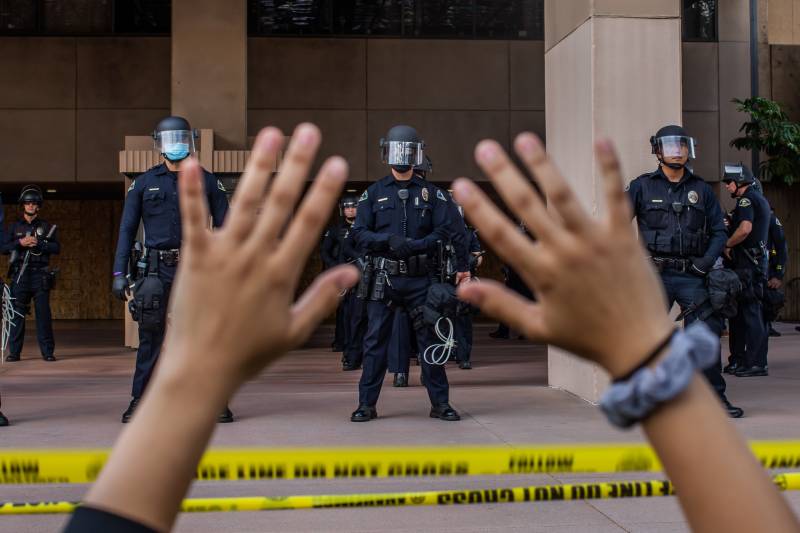Newsom credited "the most powerful force on planet Earth" — mothers — for their leadership on police reform.
"Hopefully this provides a little hopefulness, softens the edges a little bit, that your most precious — your children’s lives were not in vain and that their loss can somehow ennoble all of us to do more and be better,” Newsom said.
Fouzia Almarou, Ross’s mother, said she hoped the decertification law would help other families.
“I'm his mother,” Almarou said. “I was with him 25 years. He loved me. He loved his siblings. He has a son that he left behind. He didn't deserve this. No family deserves this.”
A provision in the law that would have held seats on the decertification board for people impacted by police violence was watered down after opposition from police unions.
In a joint statement, Los Angeles, San José and San Francisco police officer unions downplayed the importance and impact of the law.
"Despite the fanfare, Senator Bradford’s attempt to decertify peace officers for traffic tickets, unfounded complaints and unsubstantiated allegations was defeated,” they said in the statement, pointing out that the panel can only recommend decertification to POST. “Now that a decertification process has been established, we urge Senator Bradford and the legislature to focus on reducing the rise in shootings, homicides, and robberies each of our cities are grappling with."
The Peace Officer Standards Accountability Advisory Board will be made up of nine people appointed by the governor. The law states the governor should give preference to people who have experienced police violence, but does not require it.
SB 2 also removes some of the immunity protections that police officers claim, making it easier for people to sue individual officers for their actions.
Newsom on Thursday also signed AB 89, or The Peace Officers Education and Age Conditions for Employment Act, or PEACE Act, which raises the minimum age of eligibility to become a cop from 18 to 21 and expands education for officers. He also signed AB 26, which requires officers to intervene if they see a fellow officer using excessive force and protects them from retaliation if they report another officer for violating policy.
Newsom also signed a measure, AB 48, setting statewide standards for when officers can use "kinetic projectiles" like rubber bullets and chemical agents or tear gas to break up peaceful demonstrations. Police also are prohibited from aiming rubber bullets, beanbags and foam rounds at anyone’s head, neck or other vital areas.
During the 2020 racial justice protests, some demonstrators acting peacefully were injured by rubber bullets and other projectiles.
The new law also requires training officers to use less-lethal weapons only when someone is at risk of death or serious injury, or “to bring an objectively dangerous and unlawful situation safely and effectively under control.” Officers will have to give verbal warnings and try other deescalation tactics first.
The family of Bay Area man Angelo Quinto, a Filipino immigrant who died in the custody of Antioch police in December, attended in support of another new law, Assembly Bill 490, that bans police from using restraints that cause positional asphyxia.
Quinto’s sister called police for help when her brother was having a mental health crisis. One officer put his knee into the back of Quinto’s neck while another restrained his legs. His death was ruled an accident earlier this month.
At the press conference, voices in the gym cried out, "Say his name."
“Kenneth Ross,” came the answer. “Angelo Quinto,” came another.
Reporting from The Associated Press was used in this post.


